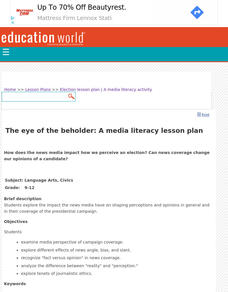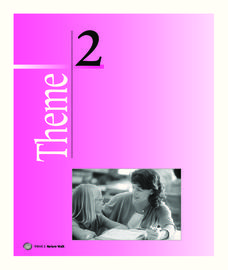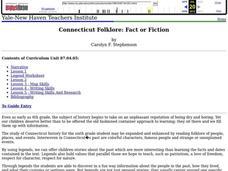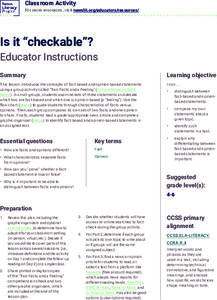Curated OER
The Eye of the Beholder: A Media Literacy Activity
High schoolers explore the impact the news media have on shaping perceptions and opinions in general and in their coverage of the presidential campaign.
Curated OER
Discussing Non-Fiction Texts
Discuss non-fiction texts and fact and opinion. Learners discuss the features of non-fiction text, identify how to distinguish fact from opinion, and list ways to display information, including graphs, charts, and diagrams. While this is...
Education Bureau of Hong Kong
Evaluating Casual Claims
Responsible decision making relies on the ability to a recognize, analyze, and evaluate claims. The worksheets and activities in this 32-page packet teach learners how to distinguish among opinions, reasoned arguments, facts, and logical...
Houghton Mifflin Harcourt
Nature Walk: Extra Support Lessons (Theme 2)
Reinforce concepts such as long vowels, spelling patterns, sound clusters, double-final consonants, and syllables with a nature-themed unit. Through a series of extra support lessons, learners compare and contrast using a Venn diagram,...
College Board
Evaluating Sources: How Credible Are They?
How can learners evaluate research sources for authority, accuracy, and credibility? By completing readings, discussions, and graphic organizers, scholars learn how to properly evaluate sources to find credible information. Additionally,...
Curated OER
The Adventures of Huckleberry Finn: Problematic Situation
Individuals read a series of passages from The Adventures of Huckleberry Finn, rank the statements from the least to the most racist or stereotypical, and share their rankings and rationales in small groups before a whole class...
Curated OER
Lead Critical Reading
Students read opposing views on the lead contamination issue, identify the facts and opinions in each article, and infer the opinion of the author. They create an essay expressing their opinion on the issue complete with citations.
Curated OER
Water and Sewage Critical reading
Students read three articles with different points of view on the water and sanitation issues in the Florida Keys. They identify the facts and opinions in each article and write a summary. In addition, they write an essay expressing...
Curated OER
A Sweet Adventure
In this reading activity, students read a detailed story about a magic bag of candy. New vocabulary is highlighted. Students then complete a series of activities about the story, answer questions, and then do a timed writing exercise.
Curated OER
Equal Protection of the Law: Fact or Fiction
High schoolers focus on the 14th Amendment of the Bill of Rights to decide whether or not racism denies citizens of their rights under the amendment. They watch a movie, Every Two Seconds and complete a worksheet (included in the plan)...
Curated OER
Reading And Responding: Lesson 15 Nonfiction
Eighth graders examine a nonfiction selection in a teacher led lesson. They examine the author's purpose for writing the selection and identify the difference between fact and opinion. The compare and contrast expository and narrative...
Curated OER
Is That a Fact, Harry?
Students use excerpts from books to determine whether sentences are fact, fiction, or opinion. They state reasons for their choices.
Curated OER
Fact and Opinion
In this writing activity, students identify and describe the difference between a fact and an opinion. They place the cut-up words from the house ad in the correct column to indicate if they are fact or opinion.
Curated OER
Social Studies Strategies: Opinion Proof
In this strategy worksheet, students read about opinions and their proof, then use a "column note" graphic organizer to write an opinion on the left, and the support, or proof of the opinion on the left.
Curated OER
Amelia Earhart: Fact Or Myth
In this reading and history instructional activity, students research Amelia Earhart and make lists of what they believe to be facts and what they think are myths, legends and theory. No information or examples are given on this page.
Curated OER
Is That a Fact?
Third graders listen to a paragrah as it is read and write down points that they think are important. They answer several comprehension questions to check for understanding of the passage. They then read pages in their science text book...
Curated OER
Connecticut Folklore: Fact or Fiction
Sixth graders read legends to learn the history of Connecticut in a fun informative way.
News Literacy Project
Is It “Checkable”?
Upper elementary scholars test their checking skills with a lesson that challenges them to distinguish between fact and opinion. First, the class takes part in a discussion regarding a helpful flow chart. Next, learners follow the flow...
Curated OER
Information from Posters
Budding journalists examine and evaluate an informative poster advertising a public meeting to discuss city park issues. They write a paragraph explaining what they found to be effective and ineffective about the poster, then imagine...
State Bar of Texas
Baker v. Carr
Can the federal government override the state government to protect the citizens of the United States? The 1962 Supreme Court case Baker v. Carr outlines the issue of equal protection under the law. Scholars investigate with a short...
State Bar of Texas
Wisconsin v. Yoder
How far does freedom of religion truly go? The 1972 Supreme Court case Wisconsin v. Yoder introduces the concept of the free exercise clause of the First Amendment. Individuals examine the case with a short video and open discussion. To...
EngageNY
Editing Sentences and Creating Visual and Multimedia Displays for a Presentation
Let's get visual. Pupils plan visual displays to accompany their upcoming opinion speech presentations. Additionally, they practice editing sentences for clarity before revising their speech drafts.
State Bar of Texas
Engel v. Vitale
Can you bow your head and pray in school? Scholars investigate the issue of school prayer with the Supreme Court case Engel v. Vitale. A short video clip along with paired group work helps viewers form opinions on the matter. They answer...
State Bar of Texas
Brown v. Board of Education
You walk each day over 20 blocks to school as a 9-year old because the color of your skin does not allow you to attend a school in your own neighborhood. Scholars use the 1954 Supreme Court case Brown v. Board of Education to investigate...
Other popular searches
- Reading Fact and Opinion
- Fact vs. Opinion Reading
- Reading Fact or Opinion
- Fact vs Opinion Reading
- Fact and Opinion in Reading

























